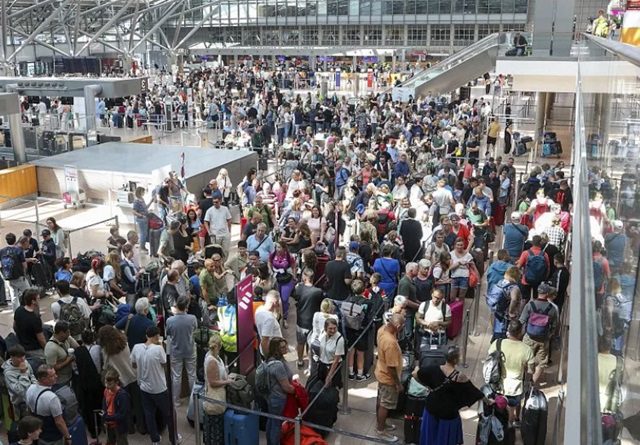BTN News: Businesses and services worldwide are slowly recovering after a massive IT outage crippled systems for hours between Thursday and Friday. This significant disruption, which affected airlines, banks, and hospitals, was triggered by a faulty software update from cybersecurity firm Crowdstrike, causing widespread computer crashes for systems running Microsoft Windows.
Crowdstrike’s CEO, George Kurtz, issued an apology for the chaos and confirmed that a fix had been deployed. However, he warned that full restoration of normal operations might take some time. “Crowdstrike is working closely with affected clients and partners to ensure all systems are restored,” Kurtz posted on social media platform X.
Widespread Impact and Ongoing Recovery
The German cybersecurity chief, Claudia Plattner, emphasized that the recovery process could take weeks given the outage’s scale. “It’s not a matter of hours, I assure you. While some affected systems have restarted, full normalization will take time,” she stated in a press conference in Bonn.
The outage had a profound impact on the healthcare sector in Germany, forcing major university hospitals in cities like Kiel and Lübeck to shut down and cancel all non-urgent operations. Jens Scholz, President of the University Hospital Schleswig-Holstein in Kiel, highlighted the severity of the situation by comparing it to aviation, where no flights were possible due to passenger data unavailability.
Aviation and Other Sectors Face Disruptions
Air travel is gradually returning to normal after thousands of flight cancellations, but delays and cancellations are expected to continue through the weekend. Polish airports have urged passengers to check flight statuses and arrive three hours early. Wizz Air reported that Warsaw Airport’s check-in system was down, affecting both airport and online check-ins.
In Greece, despite being less affected by the software glitch, major airports experienced delays and long queues. Flights could land in Athens but were unable to depart due to the outage. Similarly, Amsterdam’s Schiphol Airport and airports in Germany, the UK, Spain, New Zealand, Japan, and India reported issues, with Zurich Airport in Switzerland halting landings altogether. European airlines like KLM and Ryanair faced online check-in problems as well.
Cause of the Outage and Response
Crowdstrike confirmed that a “defect” in a Windows content update caused the outage. “This is not a security incident or a cyberattack,” assured Kurtz. He mentioned that Mac and Linux systems were unaffected and that the issue had been identified, isolated, and resolved. The company advised clients to check their support portal for updates and continue communicating through official channels.
Financial and Operational Repercussions
The incident led to a significant financial impact on Crowdstrike, with a 15% drop in stock value, equating to a $12.5 billion loss in market capitalization.
Lessons Learned and Future Precautions
Experts stress the need to reduce reliance on a few centralized platforms for remote device management. Chris Dimitriadis, cybersecurity expert and Chief Global Strategy Officer at ISACA, described the outage as a crisis, highlighting the risks of a single point of failure in our interconnected digital world. “This incident is a clear example of a digital pandemic, where one failure can disrupt millions globally. It underscores the importance of cyber resilience in safeguarding the economy and citizens’ well-being,” Dimitriadis stated.
Moving Forward
As recovery efforts continue, the global community is urged to reassess and enhance cyber resilience strategies to prevent similar incidents in the future. The recent outage serves as a stark reminder of the vulnerabilities within our interconnected systems and the critical need for robust cybersecurity measures.
In conclusion, while services slowly return to normal, the widespread impact of this outage highlights the fragility of our digital infrastructure and the urgent need for enhanced resilience and diversified dependency to safeguard against future disruptions.


